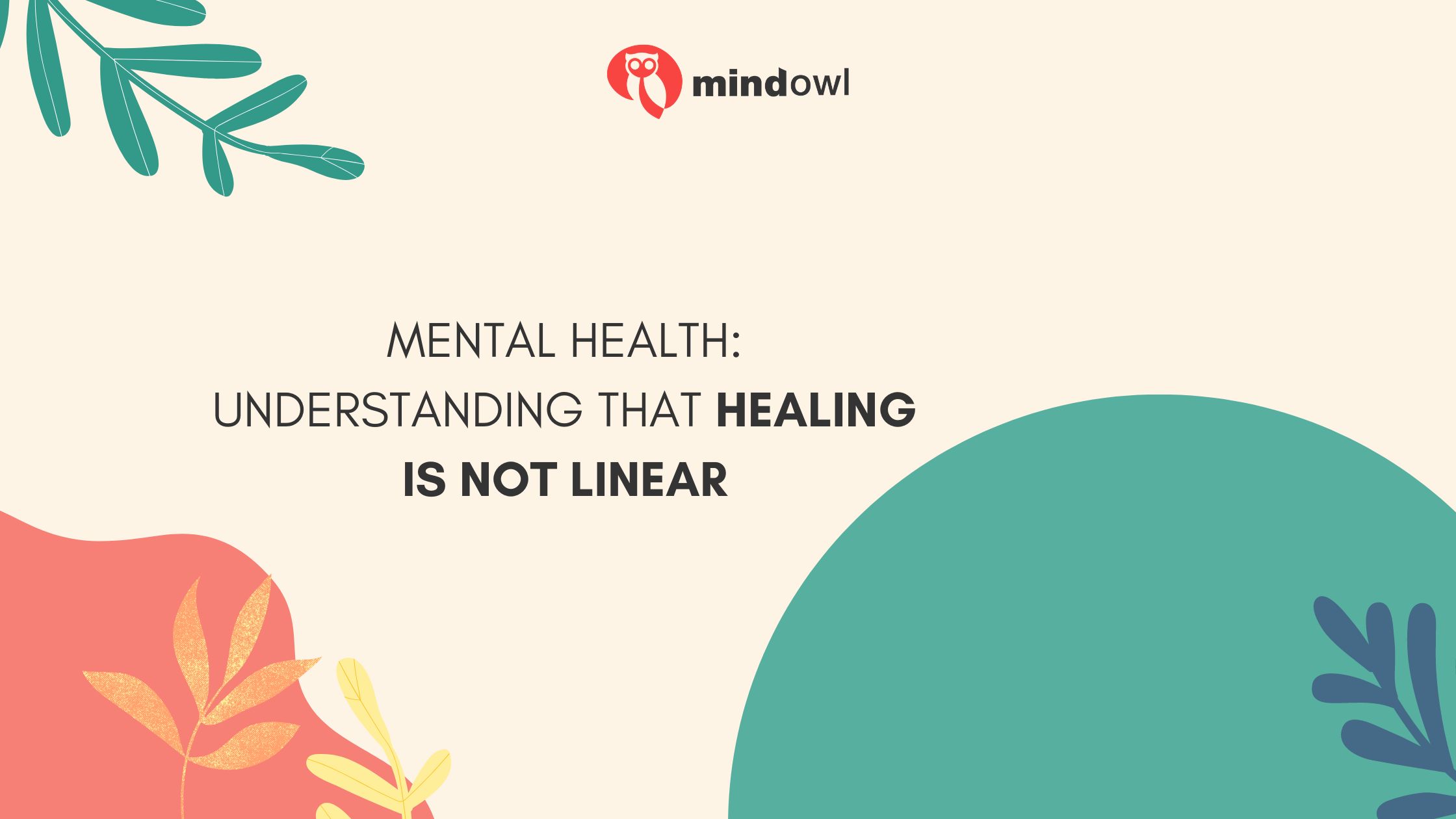
Struggling with your mental health can feel like a never-ending battle. Did you know that healing from mental illness isn’t always a straight line? In this article, we’ll explore the non-linear journey of mental health and offer support and understanding for those experiencing ups and downs in their recovery. Join us to better understand the complexities of healing.
Key Takeaways
- Healing from mental health issues doesn’t follow a straight line; it’s more like climbing a mountain with lots of turns.
- Setbacks are part of the healing process and do not mean failure. Each challenge is an opportunity to grow stronger.
- Support from family, friends, and professionals is crucial on this journey. It helps to share thoughts and offers strength through tough times.
- Mental health conditions like anxiety disorders, depression, personality disorders, and substance misuse all have their own unique non-linear paths to recovery.
- Psychotherapy can involve disruptions that lead to growth. Understanding these patterns helps in managing mental health effectively.
Mental health awareness month
May is Mental Health Awareness Month, set aside to shine a light on mental and behavioural health issues. Established in 1949, this month serves as a beacon, honouring those who live with these challenges every day.
It’s a time when organisations like NAMI join hands to support individuals and battle the stigma attached to mental illness.
This special month urges us to openly discuss what many face in silence. People with mental health problems get an extra boost of community and understanding during May. Through actions big and small, we can all contribute to breaking down barriers.
Let’s use this time to spread knowledge about recovery from mental illness while fostering compassion for each step of the healing journey.
The Non-Linear Journey of Mental Health

Understanding the concept of non-linear healing in mental health enables individuals to embrace the ups and downs of their recovery process, recognising that healing isn’t always a straightforward path.
It’s important to acknowledge that setbacks and challenges are all part of the journey towards mental wellness. Bay State experts who work in inpatient mental health facilities in Massachusetts can tell you how the process requires patience, persistence, and proper support. With the right treatment, individuals can overcome obstacles and make steady progress towards healing and well-being.
What does it mean when someone says “healing isn’t linear”?
“Healing isn’t linear” paints a picture of the mental health journey as a road with twists and turns. Imagine climbing a mountain with no straight path to the top; it’s much like that.
You might go forward, stumble, or even take a few steps back before moving ahead again. This phrase is telling us that getting better from emotional pain is not just one smooth ride.
People facing mental illness need to realise that healing has its own rhythm. Just because you have tough days doesn’t mean you aren’t making progress. It’s part of the whole life experience, including both bright and dark places.
People managing mental health conditions, such as anxiety disorders or depression, often find that progress comes in waves. For individuals with chronic diseases like POTS (Postural Orthostatic Tachycardia Syndrome), mental health challenges can add another layer of complexity, as both physical and emotional healing intersect.
Healing involves resilience, growing at your own pace, and embracing every phase—even if it means going through discomfort or relapse along the way.”.
Understanding the concept of non-linear healing
Healing can be unpredictable, with twists and turns that challenge our expectations. It’s like navigating a road with unexpected weather changes—you adapt your driving, but can’t control the storm.
Similarly, in non-linear healing, progress doesn’t follow a straight line. There will be days of sunshine where everything seems clear and bright. Then there might be cloudy days filled with old worries or sadness.
This journey is unique for each person; their path weaves through highs and lows over time. Non-linear healing accepts that setbacks are part of growth—not signs of failure. Just as life has its ups and downs, so does the process of getting better.
Understanding this helps people cope with tough times by knowing they’re normal and not a step backwards.
Challenges of Non-Linear Healing

Dealing with setbacks and the expectations of linear healing can be a major challenge in the non-linear journey of mental health. It’s important to understand that healing is not always a straightforward process, and learning to navigate this unpredictability can be a key aspect of one’s healing journey.
Expectations of linear healing
Many people expect healing to be like climbing a ladder, where each step takes you higher and closer to feeling better. They may think that once they start therapy or take medication, their mental health will improve in a clear and straight line.
But this is not how healing usually works. It’s more like riding waves, with ups and downs that are part of the process.
Getting better often means facing challenges along the way. You might have days where you feel great followed by times when old feelings come back. This can be hard to understand and accept, especially if you believed that getting help would make everything okay quickly.
It’s important to know that these setbacks don’t mean you’re failing; they’re simply parts of your unique path through healing.
Dealing with setbacks
Setbacks are part of the healing journey. They don’t mean you’ve failed or lost all progress. Instead, these moments ask you to be kind to yourself. They remind us that healing is not always linear.
Sometimes, things can get tough and might trigger old feelings or distress. But each time, you learn more about how to cope in a healthy way.
Facing setbacks can actually help you grow stronger over time. You might find new coping mechanisms that work better for you. Small steps forward still count as progress on this non-linear road to recovery from mental health challenges.
Remember, it’s okay to have days where things seem harder; they’re just detours on your path towards well-being.
The Practice of Healing
As part of the healing process, it’s important to view healing as a continuous journey rather than a linear path. This means incorporating healthier ways and seeking support from loved ones or mental health professionals.
Healing as a continuous journey
Healing takes time and often moves in spirals, not straight lines. Some days you might feel strong and full of hope. Other times, pain from the past creeps back to challenge you again.
Each twist and turn on this journey is part of growing stronger. You learn new things about yourself each step of the way.
Embrace every moment as an opportunity for growth. Add healthy habits into your life, like writing a journal or going for walks in nature. Reach out to family, friends or support groups when the road seems too tough to walk alone.
Keep moving forward even when it feels like you’re taking steps back. Healing is a path we travel our entire lives, not just a destination to reach.
Incorporating healthier ways
Finding new ways to cope with mental health struggles is like planting a garden. You choose seeds – healthy coping mechanisms – that can grow into strong habits. Think of self-care as watering and tending to your garden every day.
It could mean taking a walk, reading a book, or practicing deep breathing exercises. These actions are sunshine for the soul, helping you face challenges with resilience.
Let’s also weave the fabric of support around us, making sure it’s strong and colourful with people who care. Talk to friends, join support groups or see a therapist if you need to share your thoughts and feelings.
Sharing sensitive information can be hard at first but getting it out opens doors to fresh air for our minds. Each step forward on this path may seem small but remember; each one is a victory in its own right.
Seeking support
As you walk the path to healing, keep in mind that everyone needs help sometimes. Reach out for support. You’re not alone on this journey; family, friends, and professionals are ready to give you a hand.
They can offer comfort or guide you towards healthier habits and self-care practices. Embrace their assistance with open arms, as it can make each step a bit easier.
Support strengthens your resolve while acknowledging every small victory matters just as much as recognising setbacks. It’s all part of learning to love yourself and realising the power within you to overcome obstacles.
Let those around you be your cheerleaders; let their encouragement lift you higher. And remember, seeking help is a sign of courage, not weakness—it’s a way to harness collective strength for personal growth along this winding road of mental health recovery.
Disruptive Patterns in Psychotherapy
Psychotherapy often involves disruptive patterns that can lead to transformative growth, challenging traditional linear models of healing. To explore these dynamic shifts and gain a deeper understanding of non-linear healing, read the full blog post.
Dynamical Systems Theory
Dynamical Systems Theory (DST) is like mental health: it fluctuates, with ups and downs. Just as people’s emotions and progress aren’t always predictable, this theory recognises the unpredictability of change in therapy.
It harnesses interest in psychology by examining how disruptions impact patient recovery and understanding that mental health development isn’t always steady – just like complex systems in our bodies.
The relevance of DST shines in acknowledging that organ system networks are impacted by disruptions, often influencing patients’ prognosis negatively. This dynamic complexity underlines the non-linearity of mental health movements, emphasising that progression isn’t consistently gradual but includes fluctuations.
Life transformation and adversarial growth
Disruptions in therapy settings, discussed within Dynamical Systems Theory, can serve as catalysts for life transformation and adversarial growth. This moment of disruption becomes an opportunity for healing and metamorphosis.
Positive psychology recognises the non-linear nature of mental health and well-being, seeking to understand aspects such as adversarial growth and benefit finding.
Adversity often acts as a springboard for personal development, emphasising that challenges do not hinder progress but rather fuel transformative processes. Such disruptions can lead to profound shifts in perception and inner strength, embodying the essence of non-linear healing and the potential for positive growth amidst difficulty.
The study of discontinuities
Discontinuities in mental health journeys challenge the assumption that healing follows a straight path. Understanding these interruptions is vital, as they can lead to profound shifts in therapeutic progress.
Such disruptions are not linear and can alter the course of recovery dramatically, often demanding new strategies and approaches for effective treatment. Narrative disruptions, traumatic events, or emotional upheavals can significantly impact one’s sense of self-continuity and overall mental well-being, illustrating the intricate non-linear nature of healing.
Psychotherapy’s relevance lies in understanding disruptive patterns and their influence on behavioural disorders. Nonlinear science sheds light on this phenomenon by emphasising fractal patterns and their role in shaping therapeutic outcomes.
Mental Health Conditions and Non-Linear Healing
Mental health conditions such as anxiety disorders, depression, personality disorders, and substance misuse often involve non-linear healing journeys. Understanding how these conditions intersect with the concept of non-linear healing can provide valuable insights into the complexities of mental health recovery.
Anxiety disorders
Anxiety disorders involve intense and excessive fear and worry, which can significantly impact daily life. Individuals with anxiety disorders may experience symptoms such as negative psychotic symptoms, depression, and cognitive deficits.
It’s important to note that the treatment of substance use disorder for individuals with co-occurring anxiety disorders is a crucial aspect of mental health care.
Depression
Depression is a common mental health condition affecting millions of adults, including those experiencing non-linear healing. It can involve recurring episodes and varied symptoms such as persistent sadness, loss of interest in activities, changes in appetite or sleep patterns, and feelings of worthlessness.
Understanding its non-linear nature helps individuals navigate through the ups and downs of their mental health journey.
It’s essential to remember that seeking support and incorporating healthier ways are vital aspects of managing depression within the context of non-linear healing. This continuous journey may include adapting coping mechanisms on days when symptoms feel overpowering while celebrating brighter moments when they occur.
Personality disorders
Transitioning from the complexities of depression, we delve into the realm of personality disorders. These encompass enduring patterns of behaviour and emotions that significantly differ from societal norms.
Crucially, individuals with personality disorders often experience challenges in relating to others, regulating their emotions, and maintaining a stable self-image. It’s important to note that healing from personality disorders is an ongoing process entailing non-linear progression.
For instance, recovery in borderline personality disorder involves continual interactions between stages and processes, highlighting the non-linear nature of this journey.
Substance misuse
Substance misuse often coexists with serious mental health conditions in more than one in four adults. Addressing both aspects is essential for comprehensive treatment. The stages of addiction recovery involve recognition, preparation for treatment, and life after recovery, emphasising the multifaceted approach required to support individuals with co-occurring disorders.
Conclusion
In embracing the non-linear journey of mental health, we find that healing is a continuous practice rather than a destination. The twists and turns of this path remind us that setbacks are natural, but they do not define our progress.
By understanding and accepting the non-linear nature of healing, we can approach challenges with resilience and self-compassion. Let’s navigate this journey together, with kindness towards ourselves and others, knowing that growth often arises from the unexpected bends in the road.
FAQs
1. What does it mean when people say healing is not linear?
It means that the journey of getting better from mental illness doesn’t follow a straight path. Some days, you may feel progress; other times, it can seem like things are slipping backward.
2. Can someone with depression have good days?
Certainly! Those experiencing depression symptoms might still have moments of joy. Having a good day doesn’t mean their struggle is behind them; it’s just part of their unique healing path.
3. Is it normal to feel like I’m still struggling even after therapy or medication?
Yes, this is common for many dealing with conditions such as post-traumatic stress disorder or major depressive issues. Healing takes time and often involves ups and downs along the way.
4. How should one think about setbacks in mental health recovery?
Think of setbacks not as failures but as echoes of your past challenges that help shape your resilience, reminding you that every step, even the tough ones, leads toward remission.
5. Why do some people describe living with psychiatric conditions like a chronic illness?
Mental health issues can linger much like chronic illnesses—persistent yet manageable with care and understanding, where improvement mingles with occasional recurrence.
6. What if I don’t feel better despite trying everything to improve my mental health?
Remember there’s hope even amidst desperation; sometimes we must forge our unique approaches to managing emotional distress through reflection and continual self-care.
MindOwl Founder – My own struggles in life have led me to this path of understanding the human condition. I graduated with a bachelor’s degree in philosophy before completing a master’s degree in psychology at Regent’s University London. I then completed a postgraduate diploma in philosophical counselling before being trained in ACT (Acceptance and commitment therapy).
I’ve spent the last eight years studying the encounter of meditative practices with modern psychology.

